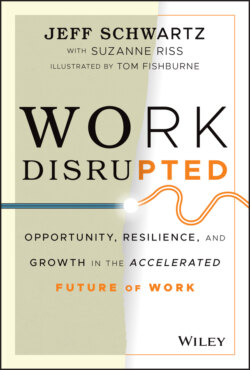Читать книгу Work Disrupted - Jeff Schwartz - Страница 19
Defining the Future of Work
ОглавлениеEven before the coronavirus pandemic, changes in how and where we work were well underway. The future of work refers to the changes that technology (including automation, robotics, and artificial intelligence) along with new employment models (including freelancers, gig workers, and crowds) will bring about in how we work, where we work, who we work with, and the skills and capabilities we need to work.
Predicting the future is hard, especially when technology is involved. Ken Olsen, the founder of Digital Equipment Corp., likely wishes he had not been so confident in 1977 when he said, “There is no reason for any individual to have a computer in his home.”30 Steve Ballmer, the CEO of Microsoft, had low expectations for the iPhone in 2007, when he announced, “There's no chance that the iPhone is going to get any significant market share.”31 And Robert Metcalfe, founder of 3Com and inventor of Ethernet, surely regrets his 1995 prediction that the Internet “will soon go spectacularly supernova and in 1996 catastrophically collapse.”32 These predictions all underestimated the growth and adoption of new technology.
My interest lies not in attempting to predict the future but in providing signposts to help others navigate the new world of work. By understanding these signposts, individuals can feel more empowered to evolve their current careers or even craft new ones altogether and to develop educational strategies to succeed in the capabilities-based market AI brings. For business leaders seeking to adopt and scale new models of working, these signposts can help explore the opportunities that novel forms of human–machine collaboration bring to the workplace. And for public policy makers, these signposts can spur the reimagination of regulations, laws, and institutional arrangements as new forms of working emerge through alternative workforce arrangements, education and workforce development, work transition programs, and financing to support lifelong learning and reinvention. Though we may not be able to change the impact of AI or future proof against the disruptions ahead, we can change the way we navigate alongside them. We can become smarter in the way we work, think, and live in the world of AI and the open talent economy of multiple forms of employment. And we can change the way we design and think about our work and workplaces of tomorrow.
